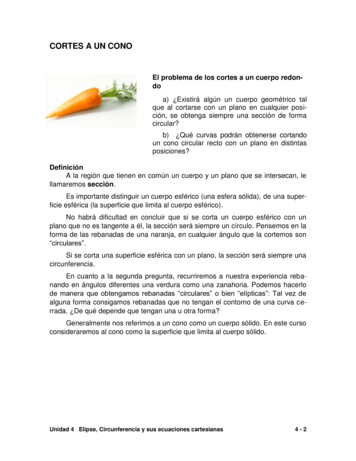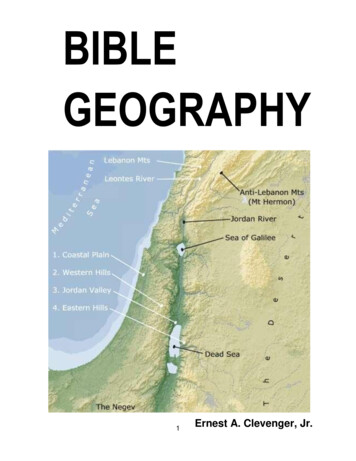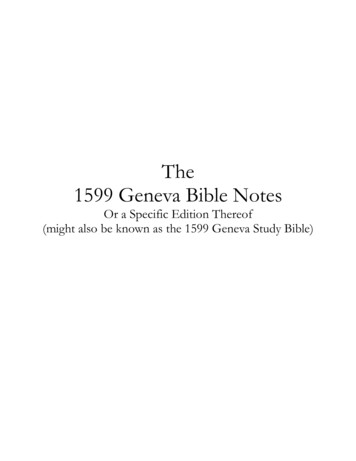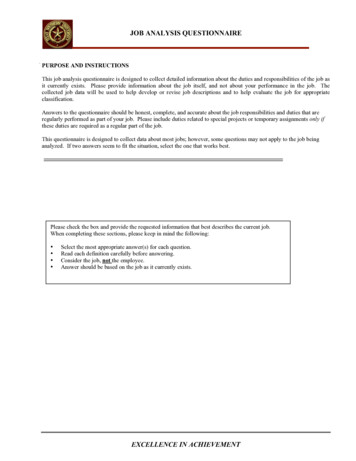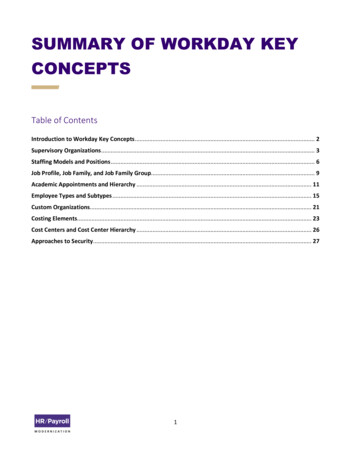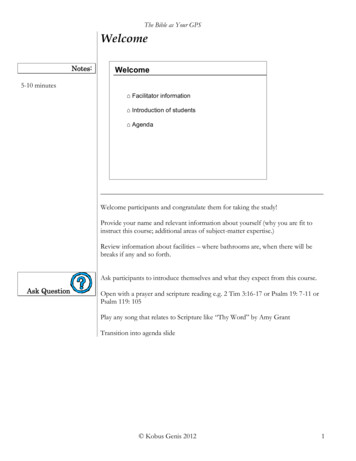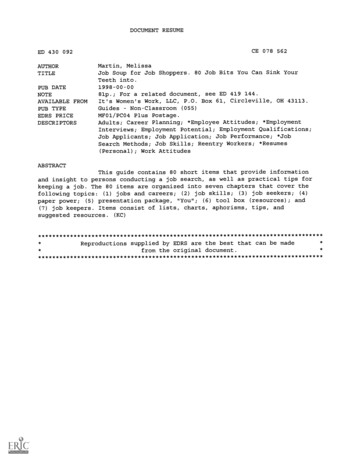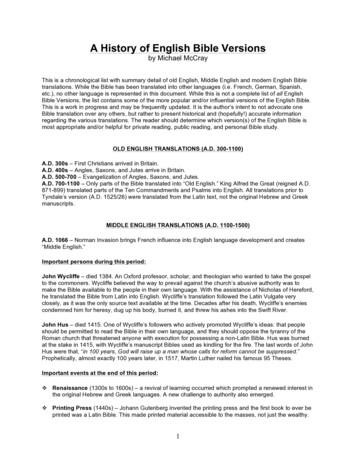
Transcription
Notes onJob2 0 2 2 E d i t i o nDr. Thomas L. ConstableTITLEThis book, like many others in the Old Testament, got its name from thecentral character in it rather than from its writer. While it is possible thatJob may have written it, there is no concrete evidence that he did."Job" means "hated" or "much persecuted." Perhaps Job was a nicknamehis friends gave him during his suffering. Job is the title of the book in theHebrew, Greek (Septuagint), Latin (Vulgate), and English Bibles.DATEConcerning the time the events recorded took place, there have been manyviews, ranging from the patriarchal age of Abraham, Isaac, and Jacob(beginning about 2100 B.C.) to the second century B.C.Internal evidence suggests that Job lived in the patriarchal period. Thelength of his life (he lived 140 years after his trials ended, 42:16) is similarto that of Terah (205 years), Abraham (175 years), Isaac (180 years), andJacob (147 years). The writer measured Job's wealth in terms of hislivestock. This is how Moses evaluated the wealth of Abraham and Jacob(1:3; 42:12; cf. Gen. 12:16; 13:2; 30:43; 32:5). The Sabeans andChaldeans (1:15, 17) were nomads during the patriarchal period, but notlater. The Hebrew word for "piece of money" (qesitah; 42:11) is foundelsewhere only in connection with Jacob (Gen. 33:19; cf. Josh 24:32).1 Jobgave his daughters inheritances along with their brothers, which was notdone under the Law of Moses (Job 42:15; cf. Num. 27:8).1Quotationsfrom the English Bible in these notes are from the New American StandardBible (NASB), 2020 edition, unless otherwise indicated.Copyright Ó 2022 by Thomas L. Constable
Dr. Constable's Notes on Job22022 EditionJob was the priest of his family (1:5), a custom that became less commonwhen nations in the ancient Near East developed more organization. Namesof people and places in the book were also common in the patriarchal age(e.g., Sheba, Tema, Eliphaz, Uz, Job). Genesis, the Mari documents, and theEgyptian Execration texts, all of which refer to life in the Near East at thistime, also refer to these names. The preference for the divine nameShaddai, over Yahweh, may indicate a period before the Exodus (cf. Exod.3:14-15). Jamieson, Fausset, and Brown believed that Job is probably theoldest book in the world.1"The idea that Job has an Edomite background is as old as theLXX [Septuagint], which equates Job with Jobab, king of Edom(Gn. 36:33)."2" the book of Job treats a fundamental question of ourcommon humanity; and the poet has studiously taken his heronot from Israelitish history, but from extra-Israelitishtradition."3If Job lived in the patriarchal period, as the evidence seems to suggest,what clues are there that someone did not write this book then, or verysoon afterwards? The detailed recounting of the conversations that tookplace certainly suggests a composition date fairly close to that of theactual events. That has been the position of Jewish and Christian scholarsfor centuries. Critics point to the fact that oral tradition was very exact inthe ancient world and that people could have transmitted Job's story bymouth for generations and retained its purity. With the Holy Spirit'ssuperintending work it could have been, but there is no evidence that thisis what happened.4Literacy was widespread in the ancient world in the patriarchal period.5Critics of an early writing further point out that in the process of socialevolution, composition of a work such as this book was more typical at a1RobertJamieson, A. R. Fausset, and David Brown, Commentary Practical and Explanatoryon the Whole Bible, p. 362.2Francis I. Andersen, Job, p. 58. Cf. Robert Gordis, The Book of God and Man, p. 66.3Franz Delitzsch, Biblical Commentary on the Book of Job, 1:6.4Roy B. Zuck listed 12 evidences that Job lived in the patriarchal in Job, pp. 9-11.5Alan R. Millard, "The Question of Israelite Literacy," Bible Review 3:3 (Fall 1987):22-31.
2022 EditionDr. Constable's Notes on Job3date much later than the patriarchal period.1 Yet, again, there is noevidence that someone wrote it later. The simpler explanation is thatsomeone wrote it early. Since there is no proof that someone wrote it later,many conservative scholars have continued to prefer the traditional earlydate of composition theory."Most recent writers [are not conservative and] are agreedthat in its original form the book was of post-exilic origin, andthe secondary parts of later composition."2"Fortunately, nothing significant is at stake in our lack ofknowledge of an author or a date of composition for thebook."3WRITERThe book does not identify its writer. Furthermore, the ancient Hebrewscould not agree on who wrote it. Consequently many different scholarshave made guesses as to who the writer was. Internal evidence has ledmany careful students of the book to conclude that it was the work of oneperson. Perhaps someone else added a few minor touches later under divineinspiration (e.g., 42:16-17).From the patriarchal period, Job himself is the favored candidate, thoughsome scholars have nominated Elihu.4 These men seem to be the mostlikely of the chief characters to have preserved the record of Job's trials.There are many examples of ancient extra-biblical writings in which theauthor spoke of himself in the third person, so we need not eliminate Jobon that ground. The book reads as though an eyewitness of the eventswrote it.1Oneconservative scholar who believed that Job was written later, in the period beginningwith Solomon and ending with the appearance of the writing prophets, was J. BartonPayne, The Theology of the Older Testament, p. 139.2H. H. Rowley, Job, p. 21. Rowley published this opinion in 1970. Cf. Gordis, p. 216-18.3Tremper Longman III and Raymond B. Dillard, An Introduction to the Old Testament, p.226.4E.g., Matthew Henry, Commentary on the Whole Bible, p. 514.
4Dr. Constable's Notes on Job2022 EditionJewish tradition favored Moses as the writer.1 In the Syriac Peshitta, Jobfollows Deuteronomy, reflecting belief that Moses wrote Job. Mosesrecorded other events during the patriarchal period in Genesis, he wasfamiliar with desert life, and he had the ability to write such a book as thisone.Solomon has supporters mainly because he composed other poetic biblicalliterature (Proverbs, Ecclesiastes, and Song of Solomon).2 Moreover thereare some similarities between Job and Proverbs, such as the relationshipbetween fearing God and being wise. There are also similarities to Isaiahand Lamentations.3Other scholars have suggested later writers, including Hezekiah, Isaiah, andEzra. John Hartley noted that the author wrote in a dialect closer toAramaic than to the Hebrew of Jerusalem, which many of the OldTestament writers used.4Of course, the writer may have been none of these individuals. No oneknows for sure who wrote Job. I tend to prefer a contemporary of Job, orJob himself, because of the antiquity of this view, and the fact that no onehas proved it erroneous. However, Delitzsch, in his excellent commentaryon Job, has made a strong case for Job living in the area south of Damascusduring the patriarchal period, and the book being written in the Solomonicera.5 There is a very old monastery, perhaps the oldest monastery inexistence, honoring Job south of Damascus.6It is refreshing to read the author of one of the most exhaustive moderncommentaries on Job admit: "Of its [the Book of Job's] author or date ofcomposition I frankly know nothing."71BabaBathra 14a (in the Babylonian Talmud).The Nelson Study Bible, p. 824.3See John E. Hartley, The Book of Job, pp. 11-12, for a chart of Job's affinities with other2SeeOld Testament books.4Ibid., p. 6.5Delitzsch, especially 1:18-26; 2:395-447.6See ibid., 2:394, for a map of this region.7David J. A. Clines, Job 1—20, p. xxix.
2022 EditionDr. Constable's Notes on Job5PURPOSEGod inspired this book to reveal answers to questions that arise from God'snature and His dealings with human beings. Specifically, what is the basison which God deals with people? Elsewhere in the Old Testament we findGod typically repaying good with good and evil with evil, but that is nothow He dealt with Job."How can a God who elsewhere in Scripture is described as thevery essence of love and grace initiate or even allow sufferingin the lives of His saints? How can His attributes be reconciledwith His actions, especially when those actions appear to runcounter to all He claims to be?"1"Why do afflictions upon afflictions befall the righteous man?This is the question, the answering of which is made the themeof the book of Job."2"The book of Job places the stress on God's ways, not Job'ssuffering."3"Besides displaying one man's faith in God in times of suffering,the book of Job also has a 'missionary' purpose. That is, abeliever's suffering should be viewed, as seen in Job'sexperience, as an opportunity to witness not only to God'ssovereignty but also to his goodness, justice, grace, and loveto the nonbelieving world."4"The final solution of the problem which this marvelous booksets forth, is then this: the suffering of the righteous, in itsdeepest cause, is the conflict of the seed of the woman withthe seed of the serpent, which ends in the head of the serpentbeing trampled under foot; it is the type or copy of thesuffering of Christ, the Holy God, who has himself borne oursins, and in the constancy of His reconciling love has1EugeneH. Merrill, in The Old Testament Explorer, p. 376.1:1. Cf. Gordis, p. 47.3Kenneth G. Hanna, From Moses to Malachi, p. 263.4Larry J. Waters, "Suffering in the Book of Job," in Why, O God? Suffering and Disabilityin the Bible and the Church, p. 111.2Delitzsch,
Dr. Constable's Notes on Job62022 Editionwithstood, even to the final overthrow, the assault of wrathand of the angel of wrath."1"At one time or another, almost everyone has felt like Job.While going through trials and times of suffering, we are oftenoverwhelmed by self-pity. We want an explanation for why Godallows trials to happen to us. The Book of Job records thetroubling questions, the terrifying doubts, and the very realanguish of a sufferer. The Book of Job can help us in the timewhen we are surrounded with troubles by giving us a glimpseof God's perspective on our suffering."2"The fact of suffering undoubtedly constitutes the singlegreatest challenge to the Christian faith, and has been in everygeneration. Its distribution and degree appear to be entirelyrandom and therefore unfair. Sensitive spirits ask if it canpossibly be reconciled with God's justice and love."3"The Book of Job represents the supreme achievement ofHebrew Wisdom."4David Clines called this book: "the most intense book theologically andintellectually of the Old Testament."5SCOPEIt is also difficult to determine how much time the events narrated in thebook cover.The first chapter tells about Job's life before his trial, and the last chapterreveals what happened after it until Job's death. The chapters in betweendeal with a relatively short period in Job's long life. How long was thisperiod?1Delitzsch,1:32.2TheNelson , p. 824.3John R. W. Stott, The Cross of Christ, p. 311.4Gordis,5Clines,p. 43.p. xii.
2022 EditionDr. Constable's Notes on Job7We have a few clues. Job referred to months when he spoke of hissufferings (7:3; 29:2). In view of Job's physical symptoms his ailmentsseem to have bothered him for several months at least. He may havesuffered for years. The apocryphal Testament of Job says Job suffered forseven years (5:9). However, Job said the same people who had respectedhim previously had come to reject and avoid him. He implied that hisrejection was fairly recent.The main part of the book contains dialogue that took place between a fewindividuals. There is no indication in the text that extended periods of timeinterrupted Job's sojourn at the city "dump" where these conversationstook place. They seem to have continued for a few days at the most,though the conversations may have stopped and then restarted. The writermay have telescoped the events to keep the narrative flowing smoothly. Itappears that the scope of the main scene at the city dump lasted no longerthan a few days or possibly weeks.GENREJob is primarily a combination of at least three literary types: lawsuit,1lament,2 and controversy dialogue.3 The larger category that includes allthree is wisdom literature."Within the canon of Old Testament Scripture, the distinctivecontribution of the Wisdom books is that they expound therelevance of the foundational covenant revelation throughMoses to the great issues of man's life in this world, morespecifically, of man's life apart from the peculiarly theocraticcontext of Israelite history."4"In terms of content, the book could be called a theodicy, ajustification of God's way in the world. Perhaps a better1SeeSylvia H. Scholnick, "Lawsuit Drama in the Book of Job" (Ph.D. dissertation, BrandeisUniversity, 1975).2See Claus Westermann, The Structure of the Book of Job: A Form-Critical Analysis, pp.1-15.3See James L. Crenshaw, "Wisdom," in Old Testament Form Criticism, pp. 228, 254.Gregory W. Parsons, "Literary Features of the Book of Job," Bibliotheca Sacra 138:551(July-September 1981):213-29, argued for all three.4Meredith G. Kline, "Job," in The Wycliffe Bible Commentary, p. 459.
Dr. Constable's Notes on Job82022 Editiondesignation of the genre of the book is 'wisdom debate.' Thisdescribes both its form and the content (Zerafa)."1There are so many different types of literature in this book that manywriters despair of assigning one type as the dominant one."The book of Job defies all efforts to establish its literarygenre. While it has been viewed as an epic,2 a tragedy,3 and aparable,4 upon close analysis it is none of these even thoughit exhibits properties belonging to each of them. As RobertGordis observes, the author of Job has created his own literarygenre.5 The book is didactic in the sense that the author seeksto teach religious truth, a task which he executes primarily bymeans of lyrical poetry expressive of deep emotions."6Franz Delitzsch regarded the book as primarily a didactic poem.7"The book of Job is an astonishing mixture of almost everykind of literature to be found in the Old Testament. Manyindividual pieces can be isolated and identified as proverbs,riddles, hymns, laments, curses, lyrical nature poems."8"Job has more words of unique occurrence and a richervocabulary than any other biblical book."9"Many Old Testament words are found only in the book of Job.In fact, Job has 110 hapax legomena (words that are not found1Longmanand Dillard, p. 232. Paragraph division omitted. Their reference is to P. Zerafa,The Wisdom of God in the Book of Job.2Nahum M. Sarna, "Epic Substratum in the Prose of Job," Journal of Biblical Literature 76(1957):13-25.3Horace M. Kallen, The Book of Job as a Greek Tragedy, pp. 3-38.4Moses Maimonides, The Guide of the Perplexed, p. 486.5Gordis, p. 7.6C. Hassell Bullock, An Introduction to the Poetic Books of the Old Testament, p. 69. SeeDaniel J. Estes, "The Hermeneutics of Biblical Lyric Poetry," Bibliotheca Sacra 152:608(October-December 1995):413-30.7Delitzsch, 1:9, 15. See also Sanford C. Yoder, Poetry of the Old Testament, p. 91.8Andersen, p. 33.9Gordis, p. 160.
2022 EditionDr. Constable's Notes on Job9elsewhere in the Old Testament)—more than any other OldTestament book."1"One should think of this aspect of interpretation [i.e., genre]as being like the Olympics, a grand occasion made up of avariety of sports. Though it is all sport, each game is playedby its own rules and has its own expectations about how toplay the game. The variety of literature is the same way. It allhas a message, but it conveys that message in a variety ofways and with a variety of expectations. To try to playbasketball with soccer's rules will never work, though both usea ball and require foot speed. Or think of musical instruments,they all make music, but in different ways with differentsounds. One cannot play the violin like a piano or drums; norshould one expect a violin to sound like either a piano or thekettledrum! In the same way, to read the poetry of the Psalmslike a historical book is to miss the emotional and pictorialimpact of the message, though both genres convey realityabout people's experience with God."2" if all the poetry [in the Old Testament] were gatheredtogether into one location, the corpus would be larger than theNew Testament."3HISTORICITYIs the Book of Job a piece of history writing, or is it historical fiction? Didthe writer accurately transcribe everything that the book records as ithappened, or sometime thereafter, or did he embellish an event and addnon-historical material? Many scholars take the book as complete fiction.41Zuck,p. 7.L. Bock, "Interpreting the Bible—How Texts Speak to Us," in ProgressiveDispensationalism, pp. 85-86.3Longman and Dillard, p. 29. See also Duane A. Garrett, "Song of Songs," in Song of Songs,Lamentations, pp. 40-47, for a helpful excursus on Hebrew poetry.4Gordis, p. 66.2Darrell
Dr. Constable's Notes on Job102022 EditionHowever, there are a number of factors that indicate that Job is notfiction.1First, the book opens with a statement that is very similar to others thatintroduce historical events (1:1; cf. Judg. 17:1; 1 Sam. 1:1). Second, otherScripture mentions Job as though he actually lived (cf. Ezek. 14:14; 20).However, there is another indication in the book that exact historicalaccuracy was not the intent of the writer: The dialogues are in poetic form,and people do not communicate with one another in poetry, especially whenthey are in extreme distress, but in prose. The dialogues do not appear tobe transcripts of what the characters actually said. They may be accuratewithout being precise.Therefore, I would conclude that Job really lived and went through the crisisthat this book describes, but that the writer of the book took liberties andreworked some of the material. Putting the dialogues in poetic form hasthe effect of elevating the book from a story about one event to a storywith universal application. I believe the story is rooted in history but toldwith literary embellishment—all under the superintending influence of God'sHoly Spirit.2OUTLINEI.Prologue chs. 1—2A.B.Job's character 1:1-5Job's calamities 1:6—2:101.2.C.II.The first test 1:6-22The second test 2:1-10Job's comforters 2:11-13The dialogue concerning the basis of the divine-human relationship3:1— 42:61SeeJ. Sidlow Baxter, Explore the Book, 3:29-32. See also Daniel J. Estes, Handbook onthe Wisdom Books and Psalms, p. 19.2SeeLongman and Dillard, p. 233.
2022 EditionA.Eliphaz's third speech ch. 22Job's third reply to Eliphaz chs. 23—24Bildad's third speech ch. 25Job's third reply to Bildad chs. 26—27Job's concluding soliloquies chs. 28—311.2.F.Eliphaz's second speech ch. 15Job's second reply to Eliphaz chs. 16—17Bildad's second speech ch. 18Job's second reply to Bildad ch. 19Zophar's second speech ch. 20Job's second reply to Zophar ch. 21The third cycle of speeches between Job and his three friendschs. 22—271.2.3.4.E.Eliphaz's first speech chs. 4—5Job's first reply to Eliphaz chs. 6—7Bildad's first speech ch. 8Job's first reply to Bildad chs. 9—10Zophar's first speech ch. 11Job's first reply to Zophar chs. 12—14The second cycle of speeches between Job and his threefriends chs. 15—211.2.3.4.5.6.D.The wish that he had not been born 3:1-10The wish that he had died at birth 3:11-19The wish that he could die then 3:20-26The first cycle of speeches between Job and his three friendschs. 4—141.2.3.4.5.6.C.11Job's personal lament ch. 31.2.3.B.Dr. Constable's Notes on JobJob's discourse on God's wisdom ch. 28Job's defense of his innocence chs. 29—31Elihu's speeches chs. 32—371.2.The introduction of Elihu 32:1-5Elihu's first speech 32:6—33:33
Dr. Constable's Notes on Job123.4.5.G.Elihu's second speech ch. 34Elihu's third speech ch. 35Elihu's fourth speech chs. 36—37The cycle of speeches between Job and God 38:1—42:61.2.3.4.III.2022 EditionGod's first speech 38:1—40:2Job's first reply to God 40:3-5God's second speech 40:6—41:34Job's second reply to God 42:1-6Epilogue 42:7-17A.B.Job's friends 42:7-9Job's fortune 42:10-17Elmer Smick saw a chiasm in the structure of Job:1APrologue chs. 1—2BJob's opening lament ch. 3CDialogue disputes (3 cycles) chs. 4—14; 15—21; 22—27DC'B'A'Interlude on wisdom ch. 28Monologues (3 cycles) chs. 29—31 (Job); 32—37 (Elihu);38—41 (God)Job's closing contribution chs. 40:3-5; 42:1-6Epilogue ch. 42:7-17MESSAGEWhat this book is all about has been the subject of considerable debate.Many people think God gave it to us to provide His answer to the age-oldproblem of suffering.2 In particular, many believe it is in the Bible to help us1ElmerB. Smick, "Architectonics, Structural Poems, and Rhetorical Devices in the Book ofJob," in A Tribute to Gleason Archer, p. 88. Cf. Westermann; J. F. A. Sawyer, "TheAuthorship and Structure of the Book of Job," Studia Biblica 1 (1983):253-57.2E.g., Arno C. Gaebelein, The Annotated Bible, 2:1:127.
2022 EditionDr. Constable's Notes on Job13understand why good people suffer.1 This is undoubtedly one of thepurposes of the book, and one that I want to comment on at some lengthin the following exposition. However, I think another purpose is morefoundational than this one.At least one expositor believed that the primary purpose of the book is toteach repentance.2 This has not been the conclusion of most students ofJob.Other people have focused on the great questions Job voiced in the book.During his suffering, when God allowed Satan to knock all the props thatsupport human earthly existence out from under him, Job got down to themost basic needs that people face. He made many profound observationsabout life. He articulated the most fundamental needs that human beingshave. He voiced the greatest philosophical questions about life. Thesequestions are an extremely important contribution of the book, to which Iplan to give some attention. Nevertheless, I think God has inspired andpreserved the message of the Book of Job primarily for another reason.I believe He did so because this book proves that the basic relationship thatGod has established with people does not rest on retribution but on grace.This is the message statement, from my point of view.God blesses people for two reasons. These are: first, His sovereign choiceto bless; second, people's response of trust and obedience to Him. Becausewe cannot control God's sovereign choice to bless some people more thanothers, we tend to forget that. We tend to focus on what we can controlto some extent, namely: securing His blessing by trusting and obeying Him.This is understandable and legitimate, but it leads to a potential problem.The problem is that we may conclude that we can control God. Since Godblesses those who trust and obey Him, and He curses those who do not,we may conclude that if we trust and obey God, He owes us blessing in thislife.This conclusion assumes that the basis of God's relationship with people isretribution: He gives people what they deserve. Those who hold the theoryof retribution reason as follows: If I am good, God will reward me withblessing in some form, but if I am bad, He will punish me somehow in this1E.g.,2J.Baxter, 3:25.Vernon McGee, Thru the Bible with J. Vernon McGee, 2:580.
14Dr. Constable's Notes on Job2022 Editionlife. While this is normally the way God deals with human beings, it is notalways His method. Consequently, there must be a more fundamentalprinciple that governs God's dealings with people. On what basis does Godconsistently deal with us?Throughout the Book of Job, this is the major question that God isanswering. Every major character in the book—Job, Eliphaz, Bildad, Zophar,and Elihu—assumed that God governed humankind on the basis ofretribution. They believed there were no exceptions to the rule that Godblesses good people and punishes bad people in this life.Job concluded that God was unjust, since, even though he had been good,God was allowing him to suffer anyway. Job's wife agreed with him. Eliphaz,Bildad, and Zophar believed that Job had to be a bad man, rather than agood man, since he was suffering. Elihu felt that the solution to thisapparent exception to the rule was not God's injustice or Job's sin, butJob's ignorance. Elihu took a more agnostic approach to the solution ofJob's problem. He suspected Job was a bad man, but he was not as sureabout that as Job's other three friends were.The Book of Job reveals that while God usually blesses the godly andpunishes the ungodly, He does not always do so in this life. There is a morefundamental basis from which God operates. That basis is His own freechoice to bless or not bless whomever He will.We might conclude then that the basis of God's dealings with mankind isHis sovereignty. However, that answer goes too far back. God's sovereigntyreally has nothing to do with how He rules. The attribute of sovereigntyonly sets forth God's position as Supreme Ruler. How does God rulesovereignly? If it is not on the basis of retribution, on what basis is it?Evidence in the Book of Job points to God's grace as the basis of Hisdealings with people. Instead of always dealing with people in retribution,God always deals with us in grace in this life. What does this mean? Thismeans that instead of responding to our good actions with blessing, or ourbad actions with cursing, consistently, God initiates favor toward uswithout our deserving it.What is the evidence in the Book of Job that God always deals with peopleon this basis?
2022 EditionDr. Constable's Notes on Job15This comes through in God's responses to Job (chs. 38—41). In replyingto Job, God essentially reminded him of how good He had been to Job. Hepointed out how much wiser and stronger He was than Job. In all of this,God wanted to impress Job with His favor toward the patriarch. That Jobgot the point is clear from the fact that when God finished speaking, Jobsimply rested in God (42:6). He returned to his joy in being the recipient ofGod's unmerited favor—even though God had not answered his questions.Furthermore, 42:10 shows that God doubled His blessings for Job in theend.How does the conflict in heaven that we learn about in chapters 1 and 2 fitinto this view? Satan, too, believed that retribution was the basis on whichGod deals with people (1:9-11). God proceeded to show the devil that hewas wrong. God allowed calamities to overtake a good man. Then, whenJob's trouble was all over, God blessed him—even though he did not trustand obey God as he should have done during his trials (42:12-17).Satan has consistently failed to appreciate God's grace. Instead of beinggrateful for his own blessings, he has been in rebellion to obtain more thanGod gave him. Moreover he has led people to do the same things (cf. Gen.3; Matt. 4).I would also like to comment on a fourth possible message of the book thatsome people have suggested. Some students of Job have said that thewhole purpose of the book is to show God's superiority over Satan. Notmany people hold this view, but it has appealed to some. The main problemwith this interpretation, from my viewpoint, is that the dialogues andmonologues that constitute the bulk of the book, in chapters 3—41,contribute nothing to this theme. While they do contain references to God'sgreatness, they do not deal with the issue of God's superiority over Satan.Finally, here are some observations about the great revelation of this book,namely: that the basis for God's dealings with man is His grace rather thanHis retribution.First, the Book of Job appears to have been one of the first books of theBible that God gave as special revelation, if not the first. If it was one ofthe first, its subject would have been one of the most foundational forhuman beings to understand, as history unfolded.1 What more basic1SeeHanna, p. 262.
16Dr. Constable's Notes on Job2022 Editionrevelation could God give than the message of this book? The reassuringknowledge that God initiates favor toward His creatures, without theirearning or deserving it, is at the heart of God's plan of salvation and thedoctrine of God (who He is). I suggest that when we think of Job, we shouldthink of God’s grace (cf. Ps. 103:10). Charles Hodge defined grace as "loveexercised towards the unworthy."1Second, like Satan, we tend to disbelieve that God wants the best for us,and we doubt that He will give it to us. Consequently, we try to securewhat we want for ourselves. We also become ungrateful for God's grace.Ingratitude is at the root of much sin, as well as much unhappiness, in life.We should rejoice in God's grace! We should cultivate a spirit ofthankfulness (1 Thess. 5:18).Third, we tend to elevate a secondary principle of God's dealings withpeople (retribution) into the primary position, because it enables us to feelwe have some control over God. In this way we can get God to serve us,rather than our serving God. If I can obligate God to bless me by beinggood, then God owes me something. Many people, of course, believe Godowes them salvation, because they are good people. However, we cannotdictate to God how He should bless us. We can count on His promises tobless in certain ways when we relate to Him in certain ways. Yet if God doesnot bless us as we wish He would, when we do not have His promise fulfilled,we can still count on the fact that He will bless us ultimately. He will do sobecause it is His will and He has promised to bless the righteous. His basisof dealing with us is grace.What about non-believers? If God wants to bless everyone, why does Hesend some to eternal torment? The fact that some people choose not toaccept God's grace does not mean He does not reach out to them withgrace. The whole Bible is a testimony to the fact that God always has, andalways will, reach out to humankind offering unmerited favor. The basis ofGod's dealings with humankind i
Jewish tradition favored Moses as the writer.4 In the Syriac Peshitta, Job follows Deuteronomy, reflecting belief that Moses wrote Job. Moses recorded other events during the patriarchal period in Genesis,
